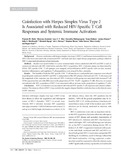Coinfection with herpes simplex virus type 2 is associated with reduced HIV-specific T cell responses and systemic immune activation.
Date
2008Author
Sheth, PM
Sunderji, S
Shin, LY,
Rebbapragada, A
Huibner, S
Kimani, J
Macdo nald, KS
Ngugi, Elizabeth N
Bwayo, JJ
Moses, S
Kovacs, C
Loutfy, M
Kaul, R
Type
ArticleLanguage
enMetadata
Show full item recordAbstract
BACKGROUND:
Chronic coinfection with herpes simplex virus type 2 (HSV-2) and human immunodeficiency virus (HIV) has been associated with an increased HIV viral load and more rapid disease progression, perhaps related to HSV-2-associated alterations in host immunity.
METHODS:
Studies were nested within (1) a cross-sectional study of men coinfected with HIV and HSV-2 and (2) women not infected with HIV, both before and after HSV-2 acquisition. HSV-2 infection status was determined by ELISA. HIV-specific CD8(+) T cell epitopes were mapped, and proliferation of HIV-specific cells was also assessed. Systemic inflammatory and regulatory T cell populations were assayed by flow cytometry.
RESULTS:
The breadth of both the HIV-specific CD8(+) T cell interferon-gamma and proliferative responses was reduced in participants coinfected with HIV and HSV-2, independent of the HIV plasma viral load and CD4(+) T cell count, and the magnitude of the responses was also reduced. HSV-2 infection in this group was associated with increased T cell CD38 expression but not with differences in the proportion of CD4(+) FoxP3(+) regulatory T cells. However, in women not infected with HIV, acquisition of HSV-2 was associated with an increase in the proportion of regulatory T cells.
CONCLUSIONS:
HSV-2 coinfection was associated with reduced HIV-specific T cell responses and systemic inflammation. The immune effects of HSV-2 may underlie the negative impact that this coinfection has on the clinical course of HIV infection
URI
http://www.ncbi.nlm.nih.gov/pubmed/18444797http://erepository.uonbi.ac.ke:8080/xmlui/handle/123456789/42357
Citation
Sheth PM, Sunderji S, Shin LY, Rebbapragada A, Huibner S, Kimani J, Macdonald KS, Ngugi E, Bwayo JJ, Moses S, Kovacs C, Loutfy M, Kaul R.; Coinfection with herpes simplex virus type 2 is associated with reduced HIV-specific T cell responses and systemic immune activation.;J Infect Dis. 2008 May 15;197(10):1394-401.Publisher
University of Nairobi, College of Health Sciences,
Collections
- Faculty of Health Sciences (FHS) [10378]

